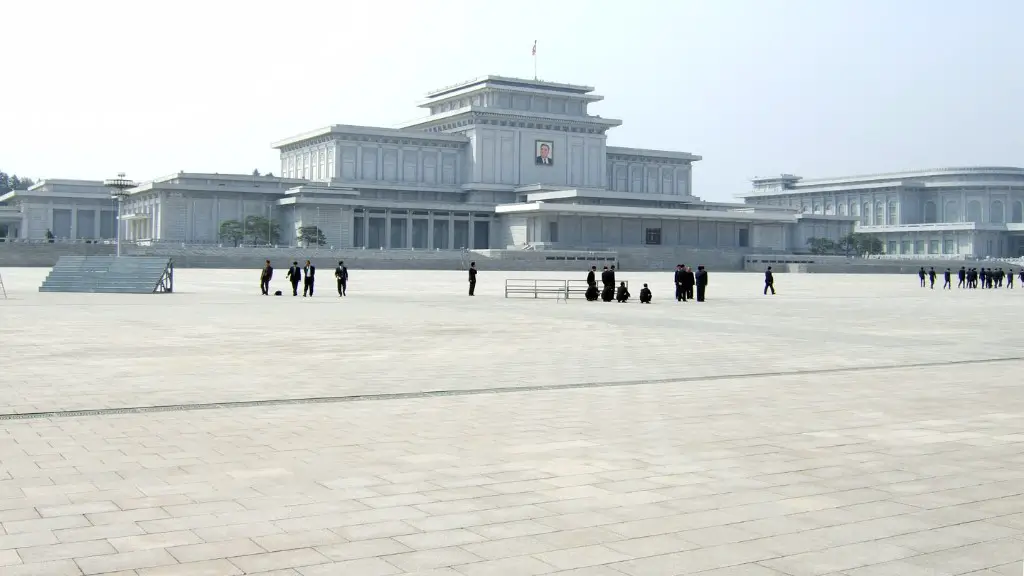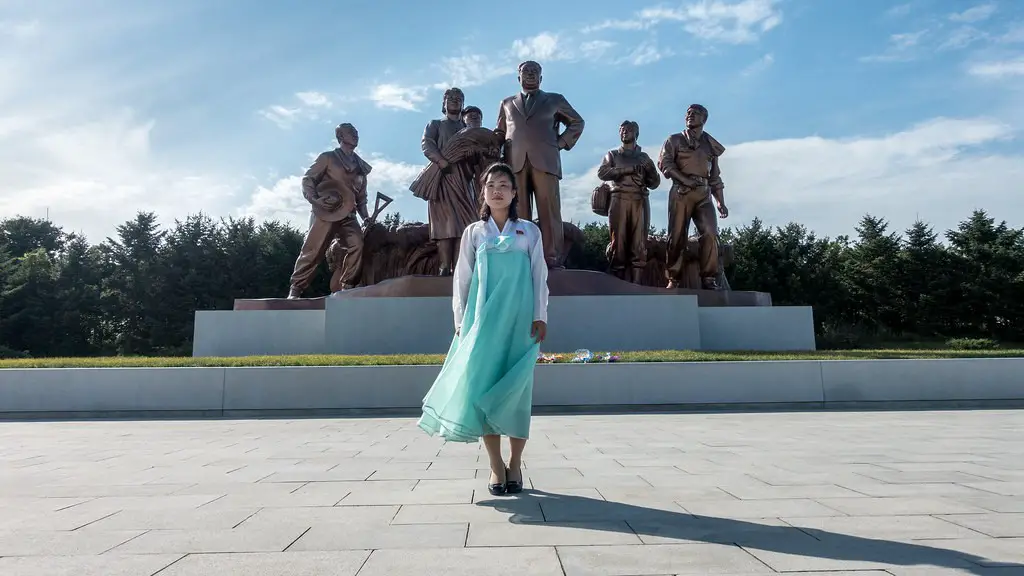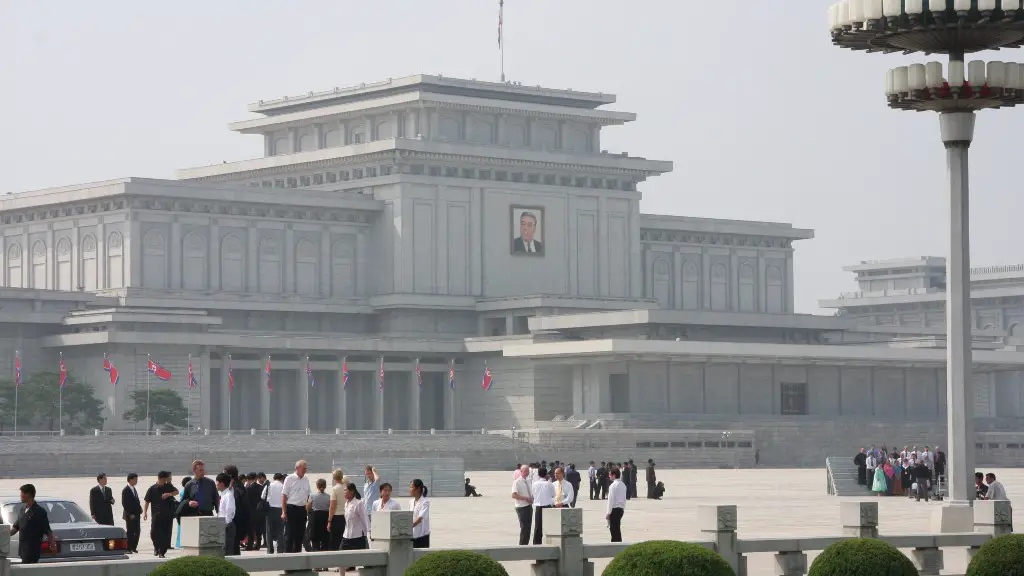Background
North Korea is a small nation in East Asia, known officially as the Democratic People’s Republic of Korea. It is surrounded by countries with vastly different timetables, as both South Korea and Japan follow the international standard of the Gregorian Calendar. The Gregorian Calendar is the most widely used civil calendar in the world, yet it is not the official time used in North Korea.
North Korea stands in stark contrast to its neighbors since it follows the so-called ‘Juche’ Calendar. The Juche Calendar was created in 1997 to honor Kim Il-Sung’s life. It is not based on the Gregorian Calendar, and is off by close to 70 years in relation to it.
Current Date in North Korea
The year in North Korea is currently 108 of the Juche calendar, or 2019 from the Gregorian calendar. This discrepancy is due to the fact that the Juche calendar starts from the birth of Kim Il-Sung, which is set at April 15, 1912. The current time in North Korea is referred to as ‘Juche 108’, and the years before 1912 are labeled ‘Juche 1’.
The basis of the Juche calendar is similar to the Julian Calendar in its calculations, with each year having 365 days plus 1 leap day in the 3rd month. With an extra 66 seconds per day, it does not quite line up with the Gregorian Calendar, but is still referred to as Korean Standard Time (KST).
Image Perception
The use of the Juche calendar helps North Korea differentiate itself from its neighbors and contribute to its own image as an independent country. It is also used as a form of propaganda, as it serves as a reminder for citizens of the religion-like status of the Great Leader, Kim Il-Sung. In North Korea, Kim Il-Sung is referred to as the “Eternal President,” and the importance of the calendar reflects the reverence of him in the country.
By having its own timeline, North Korea can control the narrative by providing stories that suit the country’s view of the world. It also allows the nation to focus on its own achievements, rather than providing updates that reflect the advancements of its neighbors’.
Political Significance
Though it may appear to be a trivial matter, the Juche calendar can have major political implications. It is a form of control to ensure that the ruling party retains its power and keeps citizens from understanding international events.
Every year in North Korea, April 15th is celebrated as the Day of the Sun to mark the birth of Kim Il-Sung and the beginning of the Juche era. Each year the date is taken into account when North Korea sets its annual plans. Since the yearly anniversary is calculated with the Juche calendar, North Korean citizens are kept in the dark regarding world events and developments from around the world.
Tension with the World
The discrepancy between North Korea and the rest of the world has created tension between the country and its neighbors. Citizens have limited access to international news, while foreign media is prohibited in the country. As a result, the North Korean government is able to remain in power and spread their propaganda in an undisturbed manner.
In addition, North Korea has complicated relations with the United States, as both nations use different time frames, meaning events and strategies may appear to be happening at different times. This discrepancy can often cause turmoil between the two sides, especially in terms of international diplomacy.
International Standardization
Due to its uniqueness, the Juche Calendar is not utilized worldwide, as the international standard is the Gregorian Calendar. North Korea’s usage of their own timeline has resulted in a disconnect with the global community, causing a major information lag in the nation.
While having a distinct calendar may help to maintain national pride and promote propaganda, North Korea continues to lag in terms of technological and scientific development, as it does not recognize globally accepted standards and norms.
Conclusion
The discrepancy between North Korean and international time frames has had a major effect on the nation and its people. The Juche Calendar is based on the leader’s birth and used to promote propaganda in the country, while foreign media is largely prohibited. As a result, North Korea has lagged far behind other countries in terms of technological and scientific development.
International Reactions
The Juche Calendar has had an impact on the international community as well, as some experts have expressed concern at the implications of North Korea adhering to its own calendar. The discrepancies between the Juche and Gregorian calendars have caused confusion in diplomatic and economic situations between North Korea and the rest of the world.
International experts have been quick to criticize the North Korean government for its continued usage of the Juche Calendar, claiming it shows the nation is “out of step” with the world. Despite their best efforts, North Korea is still falling behind in terms of progress due to the fact that the Juche Calendar is not used worldwide.
Possible Solutions
The international community has been keen to work with North Korea in order to resolve the situations caused by the discrepancy in time frames. In order to bridge the gap between the Juche and Gregorian calendars, some experts have proposed that the international standard should be used in official documents and negotiations with North Korea.
The international community has been attempting to negotiate a universal time frame with the North Korean government, though the nation has yet to agree to universalize its timeline. As a result, it is unclear when the international community will be able to reach a consensus with North Korea on a single timeline,
Social Media Impact
The Juche Calendar has had an effect on North Korea’s limited access to social media. With the majority of the population having limited or no access to the internet, posts with the Juche date are often unable to be widely seen by the general public.
This has caused difficulties in authenticating information and sources that have come from North Korea, as most current posts continue to use the Juche calendar. As a result, posts can be difficult to read and share due to the dates being off by 70 years.
Education Impact
The use of the Juche Calendar has had a significant impact on the education system in North Korea. As the Gregorian Calendar is not used in the nation, most historical events and developments are told from a biased North Korean perspective, as the Juche date does not take into account outside events or advancements.
North Korean textbooks are often filled with propagandistic statements that portray the country in a positive light, making it difficult for citizens to understand the international standard or learn about events happening outside of their borders.
Economic Impact
The Juche Calendar has also had an affect on North Korea economically. International companies often struggle to understand North Korean dates and events, causing delays and confusion in business deals and the international market.
This can have a major effect on productivity and profits, as companies will have to adjust their timetables and resources to accommodate the timeline discrepancy. Additionally, the international community may have to look towards other markets if North Korea continues to use the Juche Calendar.



